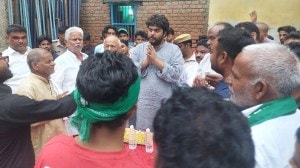Maharashtra Finance Commission recommends water cess hike
PUNE, MAY 3: The first State Finance Commission report has recommended to the State Government that all civic bodies increase water rates...

PUNE, MAY 3: The first State Finance Commission report has recommended to the State Government that all civic bodies increase water rates in phases so as to recover the cost of civic works, and that schemes be implemented on a no-profit-no-loss basis.
The report, submitted to the Government recently, has made other important recommendations pertaining to civic taxes and octroi. Figures relating to financial and other aspects of municipal corporations are only for the years between 1990 and 1995, and could have little relevance today. However, they give an understanding of financial problems faced by municipal corporations.
For instance, in 1995, the Pune and the Pimpri-Chinchwad Municipal Corporations, which had road lengths of 570 km and 439 km respectively, faced a deficit of Rs 13.59 crore and Rs 6.9 crore in funds required for road repairs. The actual amount spent for road repairs was very small, while the required amount for the work was very high.
The State Government grants ten per cent of motortax revenue on the basis of the city’s population. The commission report pointed out that funds given to the corporations was meagre and that more funds should be released for better road maintenance.
Regarding water supply by civic bodies, the report underlined the need for creating public awareness for the efficient use of water. These include stopping the loss of water in any manner and restricting the number of public water stand posts.
Civic bodies, particularly municipal councils, it said, should fix water rates such that water supply schemes are implemented on a no-profit-no-loss basis.
Corporations in the State are not able to impose property taxes on buildings owned by the Central Government. The report has mentioned the financial losses faced by the PMC and the PCMC, Rs 41.42 lakh and Rs 8.75 lakh respectively, as no property taxes could be recovered from the Central Government.
The PMC faced an additional loss of Rs 2.55 lakh as tax on buildings owned by the Railways could not be recoveredeither. The report recommended the State Government pursue changes in the Act or rules for recovery of taxes on Government-owned buildings. The PCMC ranked second in the State in low collection of property taxes.
Octroi constitutes nearly 70 per cent of revenue earned by civic bodies. Effective steps need to be taken to curb the evasion of octroi and loopholes plugged to increase octroi, the report said. The report also recommended that civic bodies earmark 0.5 per cent of revenue as “emergency relief fund”.
The PCMC has the highest per capita income in the State. In 1990-91, the total revenue of the corporation was Rs 63.31 crore while in 1994-95, it was Rs 115.77 crore. The per capita income in 1990-91 was Rs 1,224 and Rs 2,239 in 1994-95.
The PMC, on the other hand, had a per capita income of Rs 583 in 1990-91, and Rs 1,061 in 1994-95. The revenue earned in 1990-91 by the PMC was Rs 91.29 crore, and Rs 166.24 crore in 1994-95.
The report emphasised that transparency in the functioning of thecivic bodies was necessary to avoid misunderstanding about civic projects and programmes. The report said people’s participation in civic works was minimal. If information about civic projects was passed on to citizens, they could provide valuable suggestions. Transparency would also reduce public opposition to proposals of increase in civic taxes, it said.



- 01
- 02
- 03
- 04
- 05




























